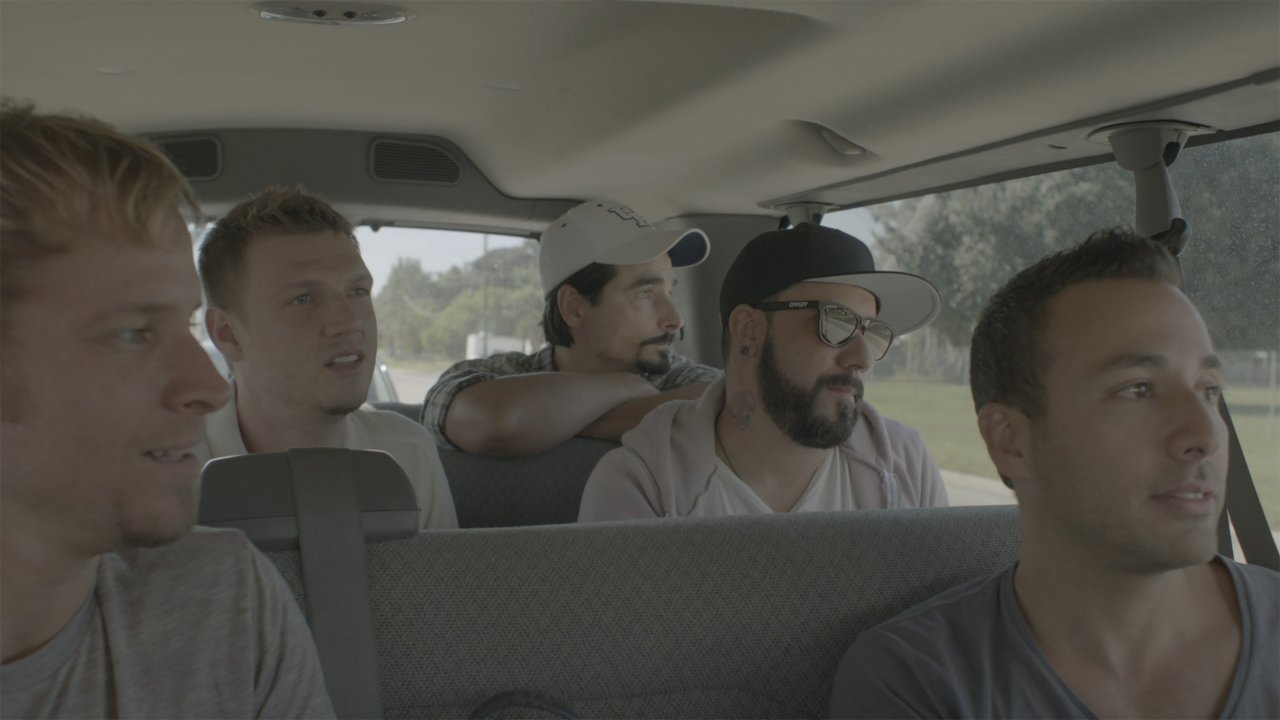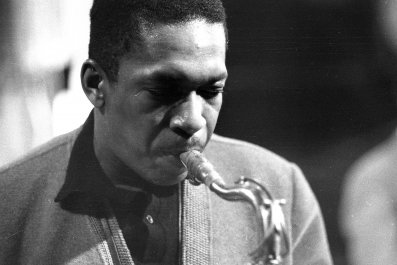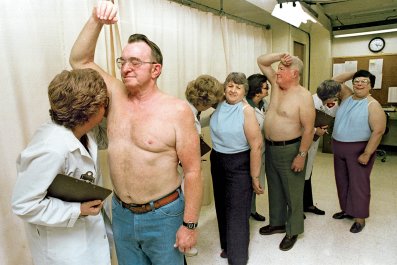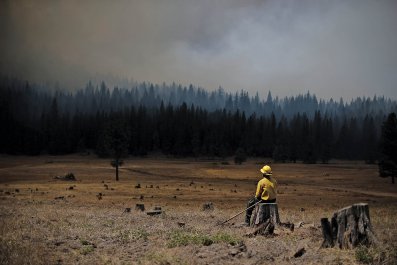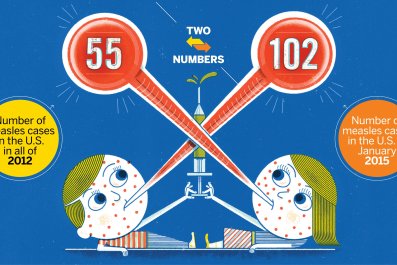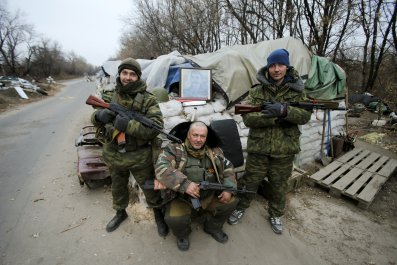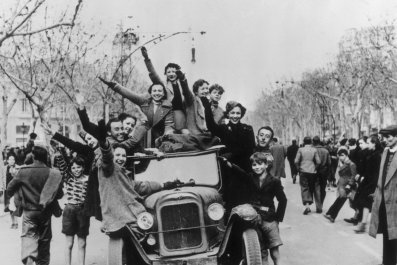It's 10 minutes before I'm going to Skype with the Backstreet Boys, and my 29-year-old self is anxiously pondering a dilemma my 10-year-old self—a BSB superfan—couldn't possibly have imagined: Which wall of my tiny, cluttered New York City apartment do I feel most comfortable letting one of the most successful boy bands in history look at over my shoulder?
Still a household name some 20 years after their first single, the Backstreet Boys — A.J. McLean, Howie Dorough, Nick Carter, Kevin Richardson and Brian Littrell — have recorded a dozen albums, and sold more than 130 million of them worldwide. They've packed amphitheaters and broken records and danced shirtless in fake rain. Their eponymous first album was released nearly two decades ago; the most recent, In a World Like This, came out in 2013. Now, coming off the domestic leg of their 20th anniversary tour, BSB are headed to the silver screen with Backstreet Boys: Show 'Em What You're Made Of, a documentary debuting in theaters and on iTunes and video-on-demand January 30.
In the weeks leading up to my anticipated BSB sit-down (busted down to a Skype chat by Winter Disappointment Juno), the cadre of PR reps coordinating things kept referring to the band as "the boys" — When can I meet the boys? How much time do I need with the boys? — and so the first few minutes of Show 'Em What You're Made Of are like waking up from a 15-year coma. Two of the "boys," Dorough and Richardson, are over 40 now. All of them are married; four have kids. In the documentary's opening scene, McLean lags behind the others during a hike in the woods. "It's just going to take me a minute," he grumbles as the guys crack jokes at his expense. "This is really shitty on my knees."
Which isn't to say that the Backstreet Boys are old, just...mature, almost the antithesis of today's coiffed and tattooed teen heartthrobs, the One Directions and Justin Biebers who are themselves the pink slime of boy bands past. Gone are the colored ski goggles, ill-advised hats and oversized hockey jerseys of BSB yore, replaced by demure button-downs and slightly less ill-advised haberdashery. In a scene filmed at the London house where the group wrote In a World Like This, Littrell carefully brings Carter a cup of hot tea. Later, he wears an apron while preparing breakfast for the group. During one rehearsal, Richardson takes to the piano wearing—gasp—cargo shorts.
"We were trying to go at this [movie] from a raw, uncensored perspective," Richardson tells me during our interview (after I've settled on the bookshelf with the brainiest titles as background). "We were not trying to make some fluffy promotional piece."
Somewhat surprisingly, they succeeded. While BSB's early fame is undeniable — cut to footage of girls passing out at packed stadium concerts and scream-crying as they press against the band's tour bus — Show 'Em What You're Made Of is as much about the group's inevitable comedown as it is about their former dominance. After the runaway success of 1999's Millennium (singles include "I Want It That Way" and "Larger Than Life"), BSB released Black and Blue in 2000 (singles include the criminally underrated "The Call"), a compilation album in 2001 and Never Gone in 2005. Then a fight over McLean's drug abuse led to a rift between him and Richardson. In 2006, Richardson announced he was leaving the band. McLean, Dorough, Littrell and Carter put out two albums and went on three tours as a foursome, but BSB wasn't the same, and wouldn't be until Richardson officially rejoined in 2012. (Both McLean and Carter credit Richardson with helping them recover from drug problems, and throughout the movie and our interview, he comes across as the group's voice of reason.)
"If you're going to do a real documentary, you have to ignore the cameras," McLean says when I ask whether the guys had a discussion about how much BSB reality they'd share on-screen. "We've aired our dirty laundry over the last 22 years, from me going to rehab to Brian's surgery [Littrell had open-heart surgery in 1998], but there's a lot that our fans don't know."
Carter adds,"We wanted to give our fans another side of us they've never seen before."
Some of that side is hard to watch if you are a fan. In addition to McLean's struggle with addiction,Show 'Em What You're Made Of touches on Carter's fight against drug abuse and his estrangement from his parents, as well as the group's fraud and theft suits against BSB founder/manager (and later *NSync creator) Lou Pearlman (who would eventually be convicted for perpetrating a $300 million Ponzi scheme). Midway through the film, a tense argument over Littrell's current ability to perform at concerts — he has what he calls "vocal tension dysphonia," which tightens the muscles around the vocal chords — is aired in full. (Watching Carter and Littrell yell "Shut the fuck up" at each other across a conference room is another thing 10 year-old me wouldn't have been able to imagine.)
But there's levity, too. Early in the documentary, the guys reflect on a high school performance where they were almost booed off the stage after their PA blew out (with Glee-worthy aplomb, they recover by singing a cappella). And in a later scene, they pop into a ballet class at Carter's former dance school, where the assembled teen girls prove too young to know the "Thriller"-esque choreography from "Everybody (Backstreet's Back)." Unfazed, BSB walks them through it.
When the 2013 tour footage starts rolling, the Backstreet Boys look surprisingly non-ridiculous for a group of adult men performing routines they popularized over a decade ago. Despite Littrell's vocal trouble, BSB still sounds great, and their dancing is sharp, a stark contrast to *NSync's brief and visibly effortful reunion at the 2013 MTV Video Music Awards. "We had literally a month to put this tour together, and about 19 days of dance rehearsals," Dorough tells me.
In a way, the Backstreet Boys faded into that good pop culture night inconspicuously. Sure, McLean and Carter struggled with addiction (statistically speaking, it would have been suspect if one of the group members hadn't). But there was no major BSB flameout, and the reassembled group could have probably lived off royalties and cameos until Medicare kicked in. That the group is bothering to still perform — their tour hits Europe, China, Australia and beyond this year — is impressive. That they're recording new music seems almost inconceivable. "Why not just hang it up?" I want to ask, at the risk of offending my top middle school crushes. "One of you could do Broadway. Another could attempt space travel." Surely there's a BSB opportunity in reality television.
Show 'Em What You're Made Of answers those questions for me. The Backstreet Boys are determined to remain a band, to keep performing and recording, to stay — indefinitely — "the boys." "We don't have a record deal," Carter says, laughing to the camera early in the movie. "It's awesome. It's like starting all over again."
Backstreet's back, alright.


